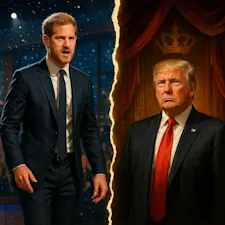
Fred C. Trump III Breaks Silence on Uncle Donald
Donald Trump's mental fitness is under a microscope like never before. At 78, the current president faces a mounting public reckoning over age, power, and denial as he approaches his 79th birthday in June 2025. Despite a recent White House report released in April 2025 declaring him fully fit with a perfect cognitive test score, critics and even members of his own family are raising red flags about his cognitive health. Observers point to slurred speech, rambling rhetoric, and a family history of dementia, fueling a growing debate about whether political loyalty is blinding the public to signs of decline.
'Lives in Fear' of Following Family Footsteps
Donald Trump's father, Fred Trump, was diagnosed with dementia in 1991 and died from Alzheimer's-related complications in 1999 at age 93. This family history has long cast a shadow over the former president's health, especially as he nears 79. Political analyst Timothy L. O'Brien recently said Trump "lives in fear" of inheriting the same cognitive decline that claimed his father, as reported by The International Business Times. O'Brien described visible signs during Trump's public appearances, including slurred speech, a weary appearance, and a slouched posture. He suggested these signs reflect a man burdened by the possibility of mental deterioration.
Adding weight to these concerns is Trump's nephew, Fred C. Trump III, who has publicly noted parallels between his uncle's recent behavior and the cognitive challenges faced by their grandfather. Fred recalled an encounter at Mar-a-Lago in 2023 where Trump appeared disoriented, repeating himself and looking tired. He also observed a shift in communication style, describing it as "outright nastiness" and a loss of inhibitions about cursing in public, as reported by PEOPLE.
Trump's campaign said Fred's interview was "completely fabricated and total fake news."
Official Reassurances Clash With Public Skepticism
The official medical narrative offers a contrasting view. In April 2025, White House physician Sean Barbabella released a health memo stating that Trump is "fully fit" to serve and his "active lifestyle" helps "contribute significantly" to his health, as reported by PEOPLE.
The report highlighted Trump's active lifestyle, weight loss from 244 to 224 pounds, and robust cardiac, pulmonary, neurological, and general physical function. It also noted that Trump achieved a perfect score on a cognitive test and is current on all recommended vaccinations.
However, critics like MSNBC host Lawrence O'Donnell have expressed skepticism about these official findings. O'Donnell criticized Trump's recent public comments, including joking about appointing himself chair of the Federal Reserve, as indicative of dementia. He warned that accepting such statements without scrutiny risks lowering the standard for presidential competence and could mislead younger generations about what is acceptable behavior from a leader.
O'Donnell also pointed to Trump's erratic rhetoric on foreign policy, including contradictory stances on Middle East conflicts and unrealistic promises, as further evidence of cognitive decline. He accused the media of applying a double standard by not holding Trump to the same level of accountability as other presidents, suggesting political bias influences coverage.
What Comes Next?
The question remains whether these concerns will lead to a more transparent conversation about Trump's cognitive health or be dismissed due to political allegiance. While the White House's health report may reassure some, visible signs and family testimony continue to raise doubts. As Trump continues his second term, the stakes are high. His ability to lead effectively depends not only on physical health, but also on mental acuity. The public deserves clear information, especially when the leader's decisions have global consequences.
The contrast between official reassurances and visible behavior invites a broader reflection: How do we balance respect for privacy and political loyalty with the public's right to know about a leader's capacity to govern?
In Trump's case, that conversation is only the beginning.
References: Trump 'Lives in Fear' of Developing Dementia, Alzheimer's Like His Father, Political Analyst Claims | Lawrence O'Donnell Finds New Signs of 'How Small' Trump's Brain Is | Donald Trump's Annual Physical Exam Reveals Medications, Weight Loss






















